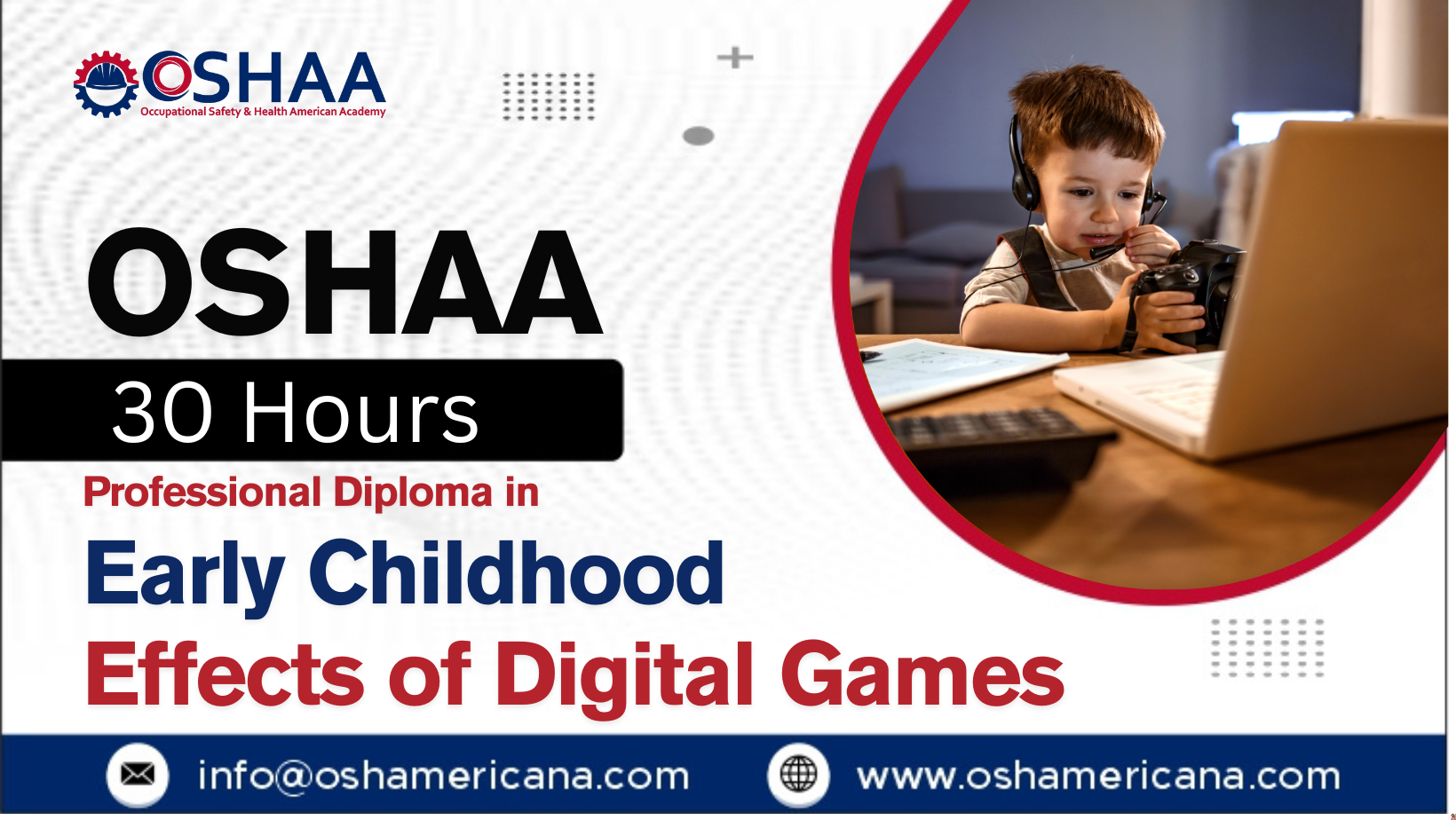As digital technologies become increasingly embedded in everyday life, young children are being introduced to screen-based entertainment earlier than ever before. While digital games can offer learning opportunities, concerns about cognitive, emotional, and behavioural impacts continue to rise. The OSHAA 30-Hours Professional Diploma in Early Childhood Effects of Digital Games offers a comprehensive and balanced exploration of this evolving topic, equipping participants with the knowledge to assess, understand, and respond to the growing influence of digital gaming in early childhood development.
Structured across 30 hours of guided learning, the course investigates the developmental implications of digital game exposure during the formative years. It explores both the benefits and risks associated with digital game use, considering neurological, psychological, educational, and behavioural perspectives. Participants will engage with current findings, theoretical frameworks, and practical case studies to develop a critical understanding of how digital games interact with a child’s environment and brain development.
This course enables participants to make informed decisions regarding children’s interaction with digital games. It empowers them to assess digital media critically, guide families and educators, and implement supportive strategies for healthy digital engagement. With a strong focus on developmental science, the diploma enhances the ability to evaluate screen time within a broader context of early childhood needs.
The OSHAA 30-Hours Professional Diploma in Early Childhood Effects of Digital Games is designed for participants with an interest in early childhood education, child psychology, health and social care, or media studies. It is especially suitable for professionals working with children aged 0–8, including early years practitioners, family support workers, and health educators.
As digital games continue to shape the experiences of young children, it is essential to understand both their developmental value and potential risks. The OSHAA 30-Hours Professional Diploma in Early Childhood Effects of Digital Games delivers critical, up-to-date knowledge that empowers participants to foster healthier digital habits and support well-rounded childhood development in a screen-saturated world.
OSHAA 30-Hours Professional Diploma in Early Childhood Effects of Digital Games
Study Units
Learning Outcomes
Introduction to Digital Games and Early Childhood Exposure (3 hours)
- Define digital games and classify different types relevant to early childhood
- Describe patterns of digital game exposure among children aged 0–8
- Explain the factors contributing to early engagement with screen-based games
- Recognise the societal and technological shifts influencing childhood digital use
Cognitive Development and the Impact of Digital Play (3 hours)
- Identify key areas of cognitive development affected by digital gaming
- Evaluate the role of interactive media in early learning processes
- Distinguish between passive screen use and active digital engagement
- Interpret current research findings on memory, attention, and problem-solving skills
Emotional and Behavioural Responses to Gaming (6 hours)
- Describe common emotional reactions of young children during and after gameplay
- Explain the link between game content and behavioural changes
- Assess the potential for dependency, aggression, or frustration in early players
- Explore coping strategies and emotional regulation through digital play
- Identify signs of overexposure and screen-related behavioural challenges
- Discuss methods for supporting healthy emotional development in digital contexts
Social Interaction, Communication, and Screen-Based Play (6 hours)
- Analyse how digital games influence early social skills and peer interaction
- Examine the effects of solitary vs cooperative gameplay in early childhood
- Understand the impact of screen use on language development and communication
- Explore the role of digital play in imaginative and collaborative scenarios
- Assess the influence of virtual environments on empathy and social cues
- Develop recommendations for fostering face-to-face interaction alongside digital use
Educational Games: Opportunities and Limitations (3 hours)
- Identify characteristics of high-quality educational games for young children
- Evaluate learning outcomes associated with game-based content
- Compare educational benefits across various types of digital platforms
- Discuss limitations and risks associated with over-reliance on digital learning tools
Screen Time Guidelines and Health Recommendations (3 hours)
- Interpret UK and international screen time guidelines for early childhood
- Understand the health implications of excessive screen exposure
- Apply practical strategies to implement age-appropriate screen routines
- Promote balanced lifestyle habits through media use planning
Identifying Age-Appropriate and Safe Digital Content (3 hours)
- Define criteria for assessing the suitability of digital games for young users
- Navigate child-friendly platforms and parental control features
- Identify harmful or misleading content in popular children’s games
- Develop skills to guide families in selecting developmentally appropriate media
Risk Factors: Attention, Impulse Control, and Sleep Disruption (3 hours)
- Explain how digital game use can influence attention span and impulse control
- Describe the relationship between screen time and sleep quality in young children
- Recognise early warning signs of overstimulation or media dependency
- Recommend interventions and routines to support healthy neurological development
Course Benefits: OSHAA 30-Hours Professional Diploma in Early Childhood Effects of Digital Games
- Provides an in-depth, research-based understanding of how digital games influence early childhood development
- Equips participants with the ability to critically assess the cognitive, emotional, and behavioural impact of digital play
- Enhances awareness of both the benefits and risks associated with screen exposure in young children
- Strengthens participants’ capacity to identify age-appropriate and educational digital content
- Offers practical strategies for promoting healthy screen habits and media literacy in early years settings
- Supports participants in guiding families, educators, and caregivers on safe and balanced digital engagement
- Builds professional competence in recognising early signs of digital overuse and screen-related challenges
- Encourages ethical and developmentally informed approaches to digital media use in childhood
- Adds valuable expertise for those working in early years education, child development, family support, or digital safety
- Aligns with UK professional standards, offering a recognised credential in a growing area of child health and wellbeing
The OSHAA 30-Hours Professional Diploma in Early Childhood Effects of Digital Games is designed for participants who seek a deeper understanding of how digital gaming influences the developmental stages of young children. It is particularly suited for:
- Early years educators and childcare professionals working with children aged 0–8
- Child development specialists and family support workers
- Health and social care professionals involved in child wellbeing
- Educational consultants and curriculum developers focusing on digital learning
- Safeguarding officers and child protection advisors concerned with screen-related risks
- Media literacy advocates and digital safety practitioners
- Participants with an interest in children’s mental, emotional, and cognitive development in a digital world
This course is ideal for anyone who plays a role in guiding or supporting early childhood experiences, especially in contexts where digital media and screen-based entertainment are present. No advanced technical background is required—only a commitment to child-centred, evidence-informed practice.







